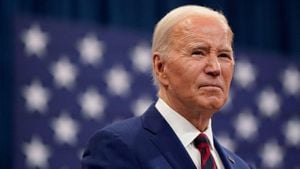When considering relationships, we often think of the bonds we share with other humans. But what if we broaden our scope and explore interpersonal connections across species and societal groups? At the University of Jyväskylä, researchers are turning the spotlight on one of the most fascinating relationships known to humans – the bond between dogs and their owners. Recent studies reveal intriguing insights about how emotional connections manifest physiologically between these two species.
The study, published in Scientific Reports, observed heart rate variability (HRV) between 30 dogs and their owners during various interactive sessions. The findings suggest remarkable synchronicity during relaxed periods; when owners exhibited reduced heart rates indicative of calm and relaxation, their four-legged friends mirrored this response. This discovery highlights the physiological underpinnings of the emotional bond shared between humans and dogs.
HRV measures the varying intervals between heartbeats, serving as a window to understand the autonomic nervous system's state. High HRV signifies relaxation, whereas low HRV is often associated with stress. So, when Fido’s heart rate aligns with yours, it indicates not just shared space but emotional synchrony. "The interconnection during resting periods suggests the owners and dogs react naturally to each other’s emotional states without external influences," senior researcher Aija Koskela explained.
Interestingly, the study didn’t only confirm the emotional bond but revealed additional layers to the interaction. Factors like the size of the dog impacted HRV, with larger animals typically exhibiting higher variability. This dynamic could indicate more secure attachment styles, particularly when paired with owners who possess heightened awareness of their dog's emotional cues. It seems our furry companions are more attuned to us than we’ve previously assumed.
Such insights effortlessly bridge to our broader discussion about relationships across varying species, as they can enlighten how we perceive and cultivate connections among diverse societal factions. For example, another noteworthy aspect is the relationship dynamics between clients and their financial advisors. A survey conducted by Dynasty Connect has unveiled pressing challenges within these human bonds, particularly among high-net-worth individuals.
The findings reveal a somewhat stagnant nature to these relationships. The data showed 52% of respondents have consistently worked with one advisor throughout, and only 25% made the move to change at least once. Many voiced apprehensions about switching due to fear of the unknown or loyalty to their advisor. This speaks to the complexity and nuances of maintaining effective relationships even within purely human confines.
Tim Oden, Chief Growth Officer at Dynasty Financial Partners, underscored the importance of evaluating these bonds: "If investors are not receiving the attention or results expected, they owe it to themselves to explore other options." This reflects not only the financial stakes involved but also the emotional weight each relationship carries. Drawing upon principles from behavioral economics, this notion reinforces how deeply emotional ties influence decision-making.
Remarkably, the aspirations and decisions surrounding the advisor-client connection often mirror those embodied in human-animal relationships. Much like the physical and emotional intertwining we observe between dogs and their owners, clients place significant emphasis on personalized care from their advisors. Across both realms, relationships are seen as entities needing careful nurturing and attention to flourish. Of the respondents, 59% cited advisors’ abilities to understand their unique needs as integral to effective partnerships.
Exploring the range of these relationships uncovers not only how individuals express concern and fidelity, but also how perceived neglect can breed frustration. The emotional dimensions of discontent when expectations are unmet resonate across species and societal groups alike. This points to the universal truth: whether it’s human-to-human or human-to-animal, relationships thrive on mutual recognition and respect for emotional states.
From the four-legged friends capturing our hearts to professional allies shaping our financial futures, the way we connect can deeply influence the fabric of our lives. The love and loyalty felt toward pets showcase how bonds can form beyond mere cohabitation. Each wagging tail or comforting presence grounds us, reinforcing the idea of love as the ultimate relationship enhancer.
Looking outside ourselves, many cultures have longstanding relationships with various species beyond domestic animals, showcasing symbiosis with birds, horses, and more. The impact of these diverse bonds often reverberates through communal structures and norms, enriching societal frameworks. Our expectations and shared emotional experiences can lead to stronger community ties, fostering environments where individuals feel secure interacting with others.
Understanding these complex dynamics allows us to navigate not just our immediate relationships but also encourages broader inclusion across diverse factions and backgrounds. This connectivity serves as the bedrock for social evolution, fostering empathy and cooperation among varying segments.
Further enriching our perspective, one should acknowledge the emotional threads binding us with all forms of life. When scholars sift through the details of interspecies dynamics, they reveal how animal companionship affects mental health – decreasing loneliness and increasing feelings of security. Imagine the ripple effects of nurturing emotional connections, not just with pets but within our professional and personal ecosystems as well.
Looking forward, it’s evident there’s much more to explore on this front. Both canine and human relationships demand our attention, underscoring the pressing need for recognition of their impact on emotional well-being and societal cohesion. By deepening our comprehension of these dynamics, we can approach life with greater zeal, forging compassionate connections and creating communities founded on respect and emotional awareness.
Even as the political climate shifts and societal structures evolve, cultivating healthy relationships remains pivotal. Whether through supporting those we love, being receptive to our advisors’ strategies, or recognizing the bonds shared with our pets, commitment and consideration must guide us. Significantly, this realization may very well define how we traverse future landscapes, building bridges and celebrating connections across every facet of life.
At its heart, the exploration of these relationships forms the basis of human experience – and perhaps offers the most rewarding lessons on the importance of belonging, loyalty, and trust. Indeed, whether with dogs or advisors, our interactions resonate deeply, embodying the essence of humanity intertwined with the wonders of the natural world.



